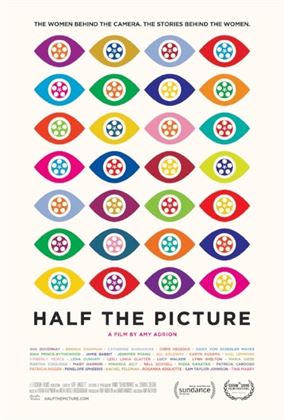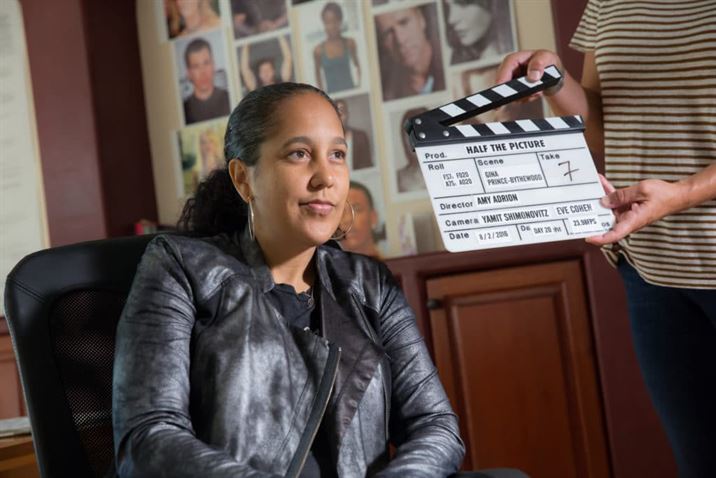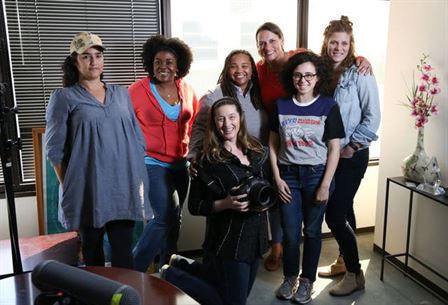Written and directed by Quentin Tarantino, Steven Spielberg, Wes Anderson…even the weakest of movie buffs are familiar with these names. Yet, can viewers say the same for names like Jill Soloway, Tina Mabry and Patricia Cardoso?
On Tuesday, Dec. 4, at 7 p.m. in the School of Communication and Media Presentation Hall, “Half the Picture” was screened followed by a panel discussion, as part of the Films and Filmmakers series at Montclair State University.
“Half the Picture” is a feature documentary that takes viewers into the lives of female filmmakers, exemplifying the inevitable adversities faced while trying to pursue their dreams.
Director of the film Amy Adrion opened up the screening event with an encouraging message to attendees.
“You will all be inspired by the women in the film,” Adrion said.
Adrion’s debut film opened with a clip from the 70th Annual Festival de Cannes as a panel of celebrities spoke about the unfair representation of women in a majority of the films shown at the event.

The documentary “Half the Picture” explores the gender disparity in Hollywood. Photo courtesy of https://www.halfthepicture.com/
Throughout the film, only one familiar face popped up: Lena Dunham, creator of HBO’s hit series, “Girls.” It should come as a concern that just one out of the many talented women depicted in the film is a definitive staple of our generation. Having not heard of any of these talented women before, the not-so-familiar faces proved to be equally as important and should be noted for their remarkable achievements.
“Half the Picture” shines a light on the female directors and creators within the industry who have made significant strides in their careers.
One might be flabbergasted to find out the director of the first installment of “Wayne’s World,” a spinoff of a Mike Myers “Saturday Night Live” sketch, is a woman named Penelope Spheeris.
Perhaps fans of “Twilight” will be elated to hear their favorite supernatural romance movie was directed by Catherine Hardwicke. “American Psycho,” the sexy psychological thriller starring Christian Bale, was — you guessed it — directed by a woman named Mary Harron.
For those who still do not think that there are inequalities in Hollywood, “Half the Picture,” is filled with statistics and inspiring stories that give evident reasons as to why it is time to make a change.
The film paints a vivid picture of how often women are overlooked in the industry because they are not getting the proper funding necessary for their films, making them seem unprofitable. They might have a family or a baby on the way, which can make it hard to commit to long hours and months of dedication, ultimately becoming an issue with production companies.
Even women who have directed successful films in the past have had their careers come to a halt as they sat and watched men, doing the same thing, land million-dollar deals. The sexism and racism running rampant in Hollywood can no longer be ignored.
“Half the Picture” does a marvelous job catching the premise of the film from all angles, including interviews from outside sources, like the American Civil Liberties Union’s Melissa Goodman, the Sundance Institute’s Caroline Libresco, Vanity Fair’s Rebecca Keegan, the University of Southern California’s Dr. Stacy Smith, San Diego State University’s Dr. Martha Lauzen and even incorporating shots of the film’s team behind the camera, interviewing and prepping.
During awe-inspiring clips of award acceptance speeches from directors like Brenda Chapman, I had to refrain from clapping in agreement, reminding myself I was at a movie screening and not the Oscars.
Many of the women interviewed in the film felt they needed to overcome the word “no,” work harder and be smarter than their male counterparts.
The film is a beautifully crafted love letter to female directors everywhere, ending with a montage of behind the scenes photographs spanning over decades of women in film.
As the film came to a close, uproarious cheers and applause flooded the air. Students who were at the edge of their seats throughout the duration of the film were in no rush to leave as the lights flickered on before the panel began.
Moderator Susan Skoog and panelists Amy Adrion, Laura Belsey (director of “Arrow” and “Criminal Minds”), Deborah Kampmeier (director of “HoundDog”) and Jennica Carmona (director of “Millie and the Lords”) sat down to answer some questions.
The insight provided by each panelist did not seem rehearsed. Each and every answer was a genuine reflection of their experiences within the industry.

Gina Prince Bythewood on set of “Half the Picture.” Photo courtesy of https://www.halfthepicture.com/
While female empowerment is an amazing movement to be celebrated, the speakers wanted to let the audience know that equality and awareness is the goal.
“I love men,” Kampmeier said. “I think the way I direct is holding the space for intimacy, and I think there is great value in that for men and women. We have a lot to offer in our way of working.”
“Half the Picture” is a must-see for any generation. With an abundance of opportunities offered to students at Montclair State for all genders, races and sexualities, it may come off as a surprise that it is rare for women to be consistently working and respected in film.
This generational gap makes it all the more important to pinpoint how gender inequalities may impact future opportunities.
“I can personally say that the fact that we are having this conversation right now, in this room amongst ourselves, and the fact that you are sitting in your seats listening is huge,” Belsey said.



